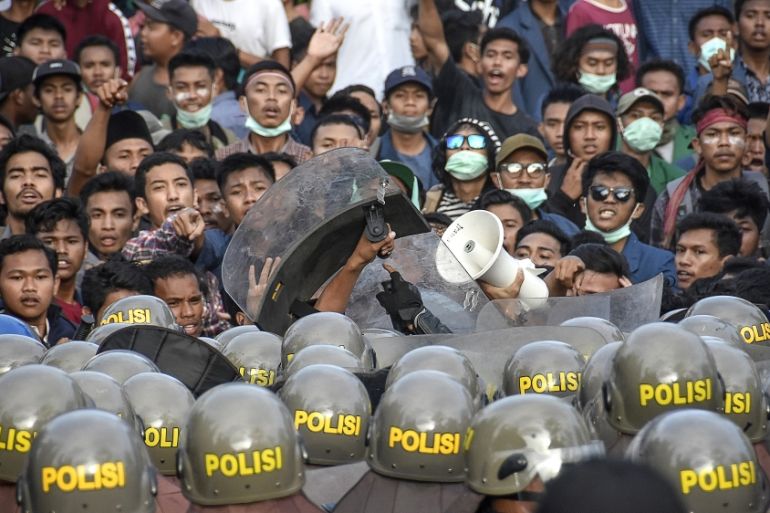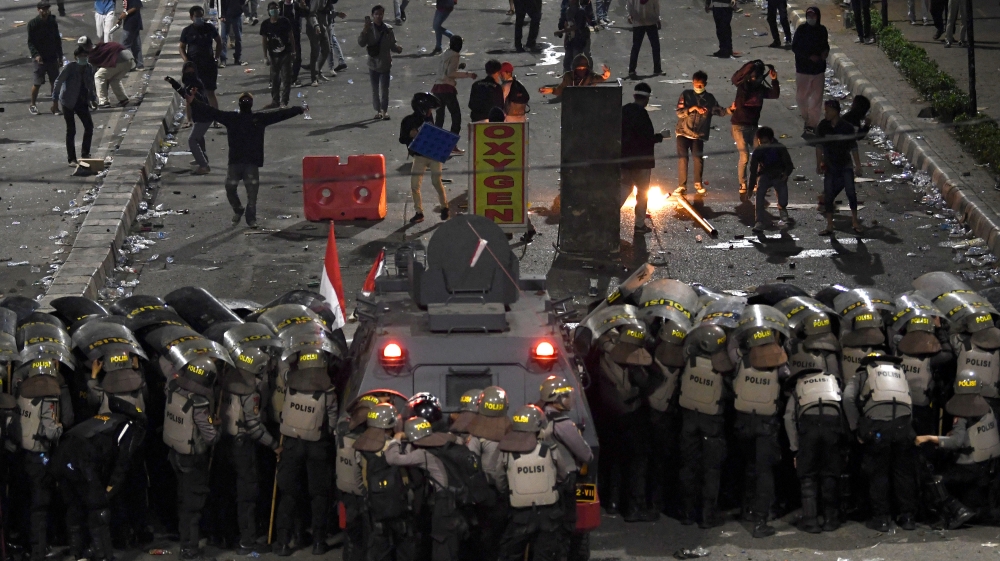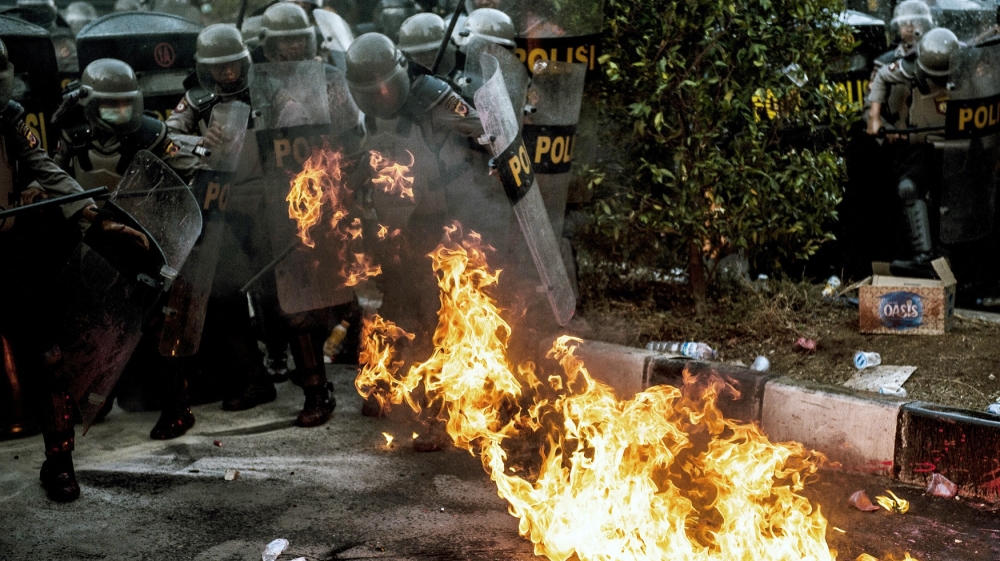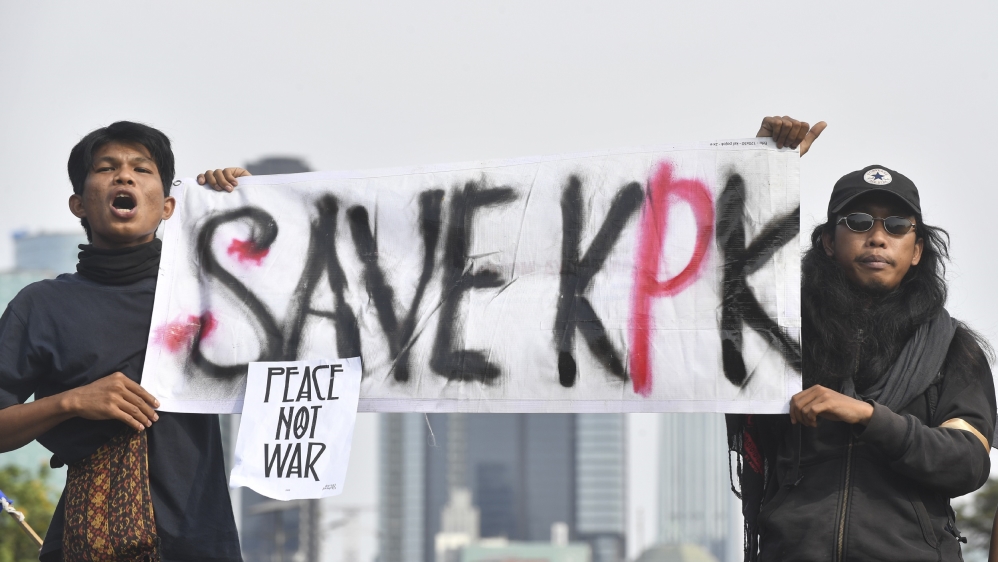New Indonesia parliament members take oath amid protests
Clashes erupted on Monday outside parliament in Jakarta as well as in West Java’s Bandung city and in Sulawesi.

Indonesia’s parliament was sworn in on Tuesday for a new session that comes amid sometimes violent protests against several new or proposed laws, including one that critics say has crippled the country’s anti-corruption agency and another that is intrusive to personal freedom.
Security was especially tight in the capital, Jakarta, where authorities blocked streets leading to the parliament building and 24,000 soldiers and police were deployed to secure key locations, including the presidential palace.
Keep reading
list of 4 itemsIndonesian voters go to the polls to choose a successor to Joko Widodo
‘Disappointed’: Indonesians reflect on legacy of departing Joko Widodo
Voters mull party or family as Indonesian president’s son runs for office
Tuesday’s ceremony included 575 legislators from nine political parties.
The legislators will be under immediate pressure to revisit the legislation, including a proposed new criminal code as well as bills on mining, land and labour.
|
|
On Monday, thousands of Indonesian protesters hit the streets anew across the country as 560 members of the House of Representatives held their last session.
Clashes between rock-throwing students and riot police broke out on Monday evening when police tried to disperse the protesters, ranging from high school to university students, who attempted to reach parliament after calm had largely returned to the country’s capital over the past four days.
Protesters set fires to tires and pelted police with rocks, gasoline bombs and firecrackers near blocked streets. Riot police responded by firing tear gas and water cannon.
Similar clashes also occurred in other cities in Indonesia, including in West Java’s Bandung city and in Makassar, the capital of South Sulawesi province, where a student was badly injured on Friday after being accidentally hit by anti-riot armor.
A protest also turned violent in President Joko “Jokowi” Widodo’s hometown of Solo city in Central Java, where an angry mob threw rocks at police, injuring at least four female officers in the head.

The demonstrators are enraged that parliament passed the law reducing the authority of the corruption commission, a key body fighting endemic corruption and which has been one of the most credible public institutions in a country where the police and parliament are seen widely as being corrupt.
The protests have grown since last week and turned violent in some cities.
At least three people, including two students in Kendari city on Sulawesi island, have died and several hundred were injured.
The death of the students sparked a national outcry, prompting Jokowi to express his deep condolences and order the National Police chief to conduct a thorough investigation.
Fighting corruption
The protests, which underline Indonesia’s challenge in changing its corruption-ridden image, have threatened the credibility of Jokowi, who recently was re-elected after campaigning for clean governance.

He faced down riots in May by supporters of the losing candidate, former General Prabowo Subianto, but those events were seen as partisan politics with limited support.
The new protests are not associated with any particular political party or group and instead are led by students, who historically have driven political change.
Student demonstrations in 1998 triggered events that led the country’s longtime strongman leader, Suharto, to step down.
|
|
The students are demanding Jokowi issue a regulation replacing the new law on the corruption commission, known by its Indonesian abbreviation, KPK. Legislators frequently attack the anti-graft commission and want to reduce its powers.
Jokowi told reporters the government would not forbid student demonstrations and called on protesters to avoid damaging public facilities.
“Our constitution guarantees freedom of expression, but the most important, do not be an anarchist who causes harm and violates the law,” Jokowi said.
He said he has listened deeply to people’s aspirations expressed by students through the protests.
Jokowi said last week he was considering revoking the new anti-corruption law, but the idea was immediately opposed by members of his coalition in Parliament.
Bambang Wuryanto, a legislator from the governing Indonesia Democratic Party in Struggle, warned that Jokowi’s political image and his ties with coalition parties would be damaged.

“That would mean that the president does not respect the House of Representatives,” Wuryanto said.
An anti-corruption watchdog, Indonesia Corruption Watch, accused legislators of trying to protect themselves after the commission named 23 sitting members of Parliament as corruption suspects, including the former House speaker and leaders of political parties.
Bivitri Susanti, a state-law analyst from the Center of Law and Policies Study, urged Jokowi to immediately issue a government regulation to annul the revised KPK Law, saying it could give people an overview of some of the articles and procedures in the new KPK Law that are indeed problematic.
“We all know that political parties have an aim to make the KPK no longer effective,” Susanti said.
“The president should consider widespread people’s aspirations rather than political parties’ interests.”
Indonesia, Southeast Asia’s largest economy, ranked 89th out of 175 countries in the 2018 Corruption Perceptions Index compiled by Transparency International.
Indonesians went to the polls in April to vote for president, members of the House of Representatives and Senate, and provincial and regional legislative councils.
Jokowi won a second five-year term and he and his allies control more than 65 percent of seats in the House, a stronger advantage than he had during his first term.
The ongoing protests and the legislation that sparked them, however, could also threaten the Jokowi’s credibility after he campaigned on a platform of clean governance.